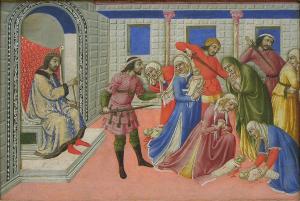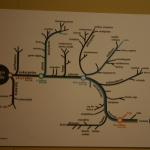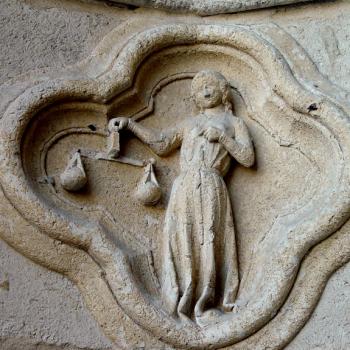
Christianity has always had people who wanted to stamp it out. Some, like St. Paul, thinking Christianity was an abomination for teaching blasphemy, had good intentions behind their attacks against the Christian faith. Those intentions can be the source of transformation, as they were for Paul, because the reason why he attacked the Christian faith (and Christ), was due to a misunderstanding, not only of what the new Christian community was teaching, but also of what God wanted for humanity. After his conversion, after his own experience with the resurrected Christ, Paul never forgot what he had done before. “For you have heard of my former life in Judaism, how I persecuted the church of God violently and tried to destroy it” (Gal. 1:13 RSV). It is because Paul’s intentions were good, God was able to use that good and guide Paul away from the evil he was doing. His hate was not of God, and when he realized this, when he realized better the nature of God, when he understood God was love, he was able to appreciate how this was revealed in Christ. Paul was able to repent and become a better man, taking the best of his instincts and having them improved, while still having to fight against his worst instincts throughout his life. While, it is true, Paul was able to be converted because of the good which existed in him and his intentions, Paul realized it would not have been enough, he needed Christ to reveal to him what he was lacking: “For I would have you know, brethren, that the gospel which was preached by me is not man’s gospel. For I did not receive it from man, nor was I taught it, but it came through a revelation of Jesus Christ” (Gal 1:11-12 RSV). Scripture gives us a few hints of the kind of encounter Paul had with Christ, but much of it remains mysterious and up to debate. The experience transcended what Paul was able to say about it. For our purpose here, it is not important for us to explain that revelation, and all that was involved with it; rather, what is significant is that he had it, and through it, Paul received the grace he need to become a new man, one which took and used the good he already had in him. Paul’s purpose, even in his attacks on Christians, was to glorify God; his zeal got the best of him, as it often gets the best of many people of religious faith, which is why, sadly, we find too many Christians, embracing a similar zeal, undermine Christ’s revelation of love as they attack those they deem to be blasphemous.
Many others who attacked Christianity were not of such good intentions. They were afraid of Christ and what he represented, because they viewed Christ, and his followers, as threats. This was often the case with people in positions of power and authority. Christianity relativized that power, telling Christians to obey their conscience, and fight against those in positions of authority if they made immoral demands. Scripture suggests this was happening ever since Christ was born, that is, Herod saw him as a threat because the Magi who came to him said they were looking for the new-born king. Upon hearing this, Herod believed a rival to his power was born, and so, he decided he would do what he could to snuff it out. But, of course, try as he might, Herod was not successful. Joseph, upon learning of the threat, took his family to Egypt:
Now when they had departed, behold, an angel of the Lord appeared to Joseph in a dream and said, “Rise, take the child and his mother, and flee to Egypt, and remain there till I tell you; for Herod is about to search for the child, to destroy him.” And he rose and took the child and his mother by night, and departed to Egypt, and remained there until the death of Herod. This was to fulfil what the Lord had spoken by the prophet, “Out of Egypt have I called my son.” (Matt. 2:13-15 RSV).
Egypt did not entirely welcome the Holy Family. While some Egyptians welcomed them and helped them as much as they could, Egyptian authorities considered them to be troublemakers. Tradition says that while they were in Egypt, the Holy Family was living their life on the run, never staying too long at any one place so they could stay ahead of the authorities who were pursuing them.[1] It must have been quite a challenge to live in a land not their own, to be afraid to go back to their homeland knowing they would be killed if they were found and returned, and yet to be in a land which did not entirely welcome them either. The plight of the Holy Family is the plight of every refugee, never knowing if they will be helped or hindered by those they meet. Nonetheless, Jesus was not meant to stay in Egypt; he was always meant to return to Israel. His time in Egypt was limited to the time when Herod was still alive. When Herod died, the Holy Family was able to return back to Israel, albeit still having to be careful, making sure they did not draw too much attention to themselves:
But when Herod died, behold, an angel of the Lord appeared in a dream to Joseph in Egypt, saying, “Rise, take the child and his mother, and go to the land of Israel, for those who sought the child’s life are dead.” And he rose and took the child and his mother, and went to the land of Israel. But when he heard that Archelaus reigned over Judea in place of his father Herod, he was afraid to go there, and being warned in a dream he withdrew to the district of Galilee. And he went and dwelt in a city called Nazareth, that what was spoken by the prophets might be fulfilled, “He shall be called a Nazarene.” (Matt. 2:19- 23 RSV).
The difference between Paul and Herod is important. Paul was a zealot, a true believer, someone who had a lot of good in him, but that good was tainted by his zeal and his misunderstanding of God and God’s ways. When Paul realized his error, when he understood even more the greatness of God, and God’s love, he was able to become a messenger of that love, showing the way such love can and will transform people. It made him especially understand the value of mercy, and the need for Christians to be merciful. Herod, on the other hand, cared for his personal power and authority, and his actions were for the sake of maintaining it. Paul would learn to die to the self, Herod, at least during his life, would not. Herod thought he could thwart God’s will be taking out the baby he feared God wanted to use to replace him, but in the end, Herod unwittingly served God’s will so that Jesus could fulfill more of the messianic prophecies, making Herod an instrument in creating the conditions for the messiah to arise..
[1] Tradition says that when they entered into Egypt, various statues of the gods started to collapse, and it was this which first drew the attention, and hate, of Egyptian authorities.
Stay in touch! Like A Little Bit of Nothing on Facebook.
If you liked what you read, please consider sharing it with your friends and family!
N.B.: While I read comments to moderate them, I rarely respond to them. If I don’t respond to your comment directly, don’t assume I am unthankful for it. I appreciate it. But I want readers to feel free to ask questions, and hopefully, dialogue with each other. I have shared what I wanted to say, though some responses will get a brief reply by me, or, if I find it interesting and something I can engage fully, as the foundation for another post. I have had many posts inspired or improved upon thanks to my readers.













